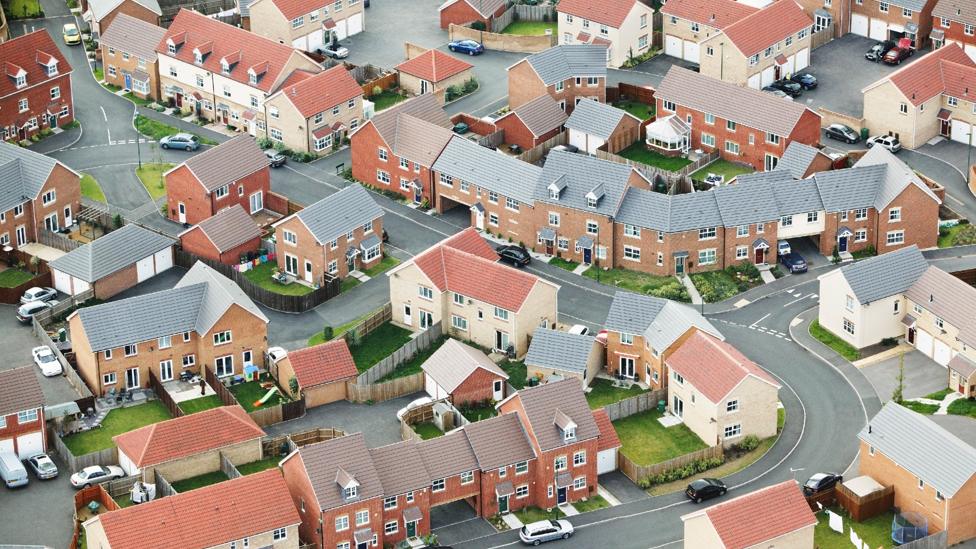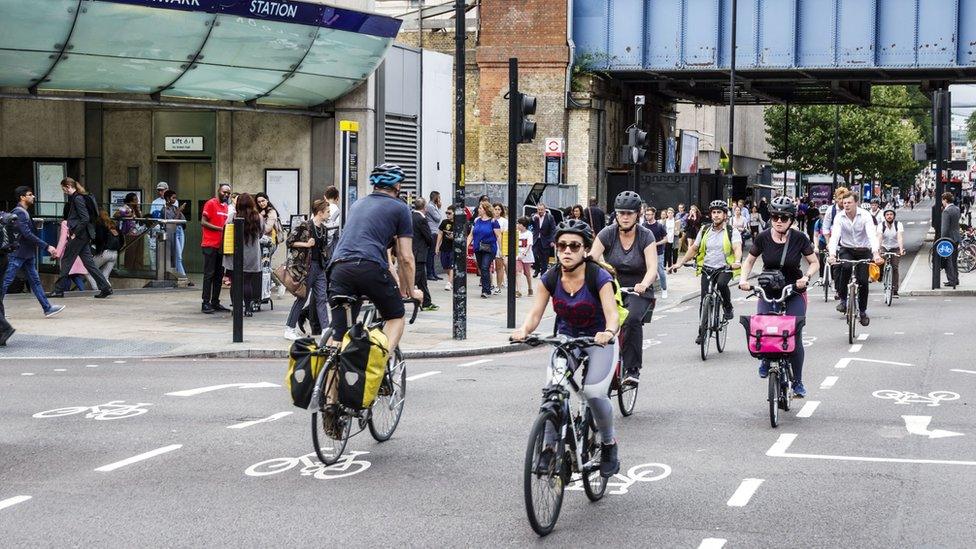New UK housing 'dominated by roads'
- Published
- comments

There is growing public concern about the impact of cars, according to a recent government survey (stock picture)
Planners and engineers have been rapped for allowing new housing developments to be dominated by roads.
A report says too many highways engineers are still approving roads that do not fully account for pedestrians and cyclists.
It follows a government survey suggesting an increase in public concern, external over the impact of cars on people's health and the environment.
The new report comes from University College London (UCL).
Its author, Prof Matthew Carmona, told BBC News: “Far too many new developments are still all about the car.
“It’s all about making sure cars don’t need to slow down. Pedestrians and cyclists just have to get out of the way.
“It’s an approach from the 1960s. We should be allowing people to walk and cycle to get to local facilities instead of having to get out the car every time. But car-dominated developments are still going up.”
His report concludes that nearly three quarters of 142 developments surveyed should not have been given planning permission.
A fifth of the schemes should have been rejected outright, and more than half should have been amended to improve a sense of place and help pedestrians and cyclists, the report added.
Prof Carmona continued: “Highways authorities are really problematic – they’re all about getting roads as cheap as possible that can be maintained cheaply – that means large areas of tarmac with no regard for walking and cycling."
He said many councils had not updated design standards since the 1970s.
And he urged the government to make mandatory its own advisory Manual for Streets, which says, external: “Streets are not just there to get people from A to B. In reality, streets form vital components of residential areas and greatly affect the overall quality of life for local people.”

The report says many schemes should have been amended to help pedestrians and cyclists
The report comes after a government poll suggested 76% of people think that for the sake of the environment, everyone should reduce their driving.
Just two years ago 63% held that opinion, suggesting that public concern is on the rise after media coverage of climate change and air pollution from vehicles.
Three quarters of people agreed that drivers should use their cars less in urban areas for the sake of public health - a figure that is also markedly higher than previously.
Craig Bennett, chief executive of Friends of the Earth, said this was a "big shift in public opinion" which showed the public was "way ahead of politicians on this issue".
The survey of more than 2,500 people was conducted for the Department for Transport and placed on its website - but without the usual press release to the media.
It may have implications for the government's plans to spend £28.8bn on roads.
Environmentalists and most opposition parties say road-building will hinder the UK's commitment to halting the carbon emissions that are fuelling global heating.
The Lib Dems said the government's spending commitments on roads, just as the public were becoming more aware of environmental issues, were "a slap in the face for the planet".
Along with Labour and the Green Party, it also criticised ministers for not publicising evidence of public support for reducing the number of cars on the roads.
Three quarters of people polled in a regular government survey on travel said we should all drive less to protect the environment.
The data is on the Department for Transport's website, but opposition parties claim it has not been highlighted because it makes government plans for huge spending on roads look out of touch.
Labour's shadow transport secretary, Andy McDonald, said the government's plan to spend nearly £30bn on new roads was "irresponsible and self-defeating".
Green Party MP Caroline Lucas told the BBC: "They are ignoring an inconvenient truth - and it's clear they are lagging way behind public opinion on roads."
Prof Carmona said: “The government’s drive to deliver more homes is absolutely right - but it mustn’t be delivered at expense of the quality of places.”
His survey judged developments on the basis of green space, local shops and lack of character as well as transport. The work was funded by the countryside charity CPRE and the Place Alliance.
The Local Government Association said: “Standards should future-proof all new homes, ensuring they are environmentally sustainable. The government should ensure homes are built to high standards with the necessary infrastructure in place.”
Andrew Whitaker from the Home Builders Federation told BBC News many of the problems identified by the report were not within the control of the builder.
He said: “Local authorities have an obligation to commit sufficient resources to deal with planning applications efficiently and to work closely with the builder to agree well-designed schemes.
"The overwhelming majority of new home-buyers are happy with their new home and the wider environment around it.”
The government told BBC News it would soon be updating its guidance on roads in the light of its 2050 climate commitments, and would achieve its climate change targets. A spokesperson said they were waiting for the right time to issue a press notice about the survey.
Follow Roger on Twitter., external